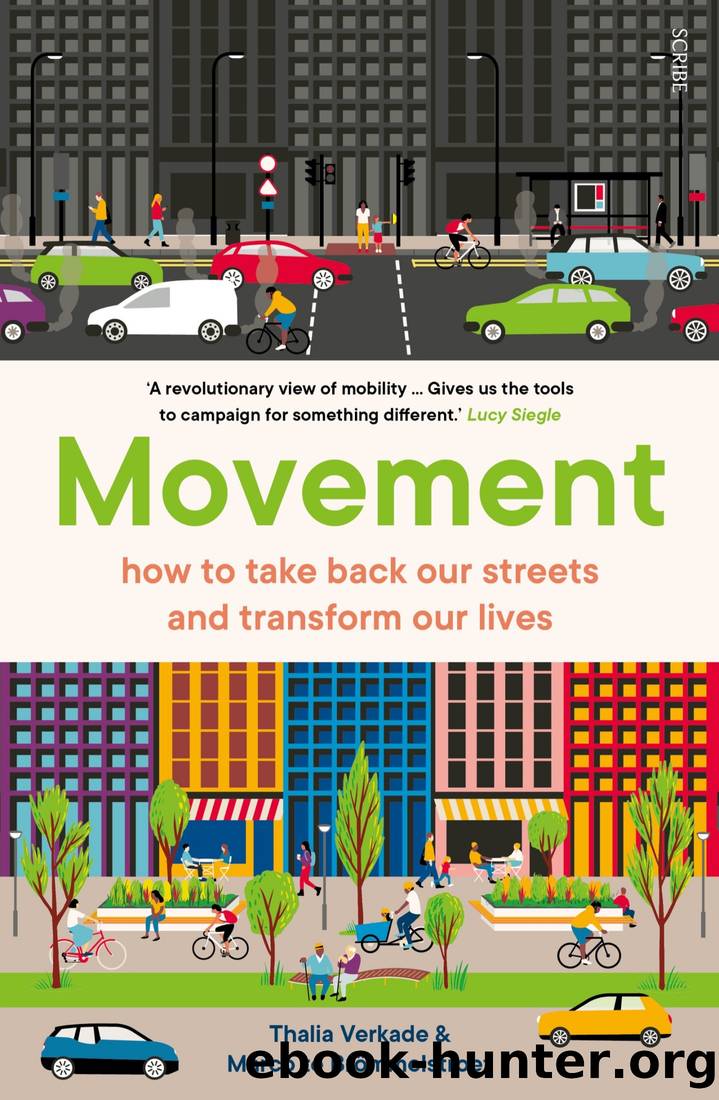Movement by Thalia Verkade

Author:Thalia Verkade [Verkade, Thalia]
Language: eng
Format: epub
Tags: TEC010000, BUS070100, ARC018000, BUS067000, POL044000, NAT011000, TEC009160, BUS072000, POL002000, SOC015000
ISBN: 9781911344971
Publisher: Scribe
Published: 2022-05-31T05:00:00+00:00
A Formula for Traffic Deaths
Niek Mouter, a transport economist and philosopher, has done some interesting research into traffic fatalities. He and two other researchers asked people how many extra minutes they would be prepared to spend travelling to save one person from dying in traffic.
There is a method governments use to calculate this: a social costâbenefit analysis or SCBA. In essence, this is simply a spreadsheet in which the value of time spent travelling and the value of a human life â which economists have set at â¬2.6 million â are offset against one another. To calculate how much 1 minute of travel time is worth, researchers conducted a survey in which several hundred people at train stations and motorway services answered a series of multiple-choice questions on how much money they would be willing to spend to reduce their journey time. This was followed by a larger online survey. Together, these produced a figure that could be used in the SCBA: 1 hour in a car is worth â¬9.25 to a commuter.34
According to Mouter, politicians are told that the SCBA shows that a gain of 45 seconds per traveller on an average motorway produces more economic benefits than preventing one traffic fatality a year. After all, if a few thousand motorists save 45 seconds of the time they spend on the road each day, that adds up to a fair bit in the course of a year. So fewer vehicle hours are lost.
And this was how, in 2011, a department of the Ministry of Infrastructure and Water Management calculated the additional traffic fatalities that would occur with the raising of the maximum speed limit to 130 km/h (just over 80 mph). With a few compensatory measures, it would all be quite acceptable.35
âBut if you ask people how long theyâre prepared to wait to avoid a death in traffic â that is, how we should deal with this collectively â theyâll immediately say theyâd have no problem waiting a quarter of an hour,â says Mouter. âWhich is 20 times as long.â
In other words, if a delivery driver runs over a five-year-old boy in the street, just about everyone would say theyâd be quite happy for the parcel to be delivered more safely later in the day, as long as no one was killed in the process.36 Yet we are only asked our views in our capacity as consumers of speed. We are treated as Homo economicus, not as the social species we are.
And politicians refer to a statistical model built on this to justify expanding motorways or to raising the speed limit. A model which turns a five-year-old boy â indeed, every human being â into a âstatistical human lifeâ.
Download
This site does not store any files on its server. We only index and link to content provided by other sites. Please contact the content providers to delete copyright contents if any and email us, we'll remove relevant links or contents immediately.
Kathy Andrews Collection by Kathy Andrews(11793)
The remains of the day by Kazuo Ishiguro(8944)
Spare by Prince Harry The Duke of Sussex(5164)
Paper Towns by Green John(5160)
The Body: A Guide for Occupants by Bill Bryson(5063)
Industrial Automation from Scratch: A hands-on guide to using sensors, actuators, PLCs, HMIs, and SCADA to automate industrial processes by Olushola Akande(5038)
Machine Learning at Scale with H2O by Gregory Keys | David Whiting(4279)
Be in a Treehouse by Pete Nelson(4016)
Never by Ken Follett(3913)
Harry Potter and the Goblet Of Fire by J.K. Rowling(3830)
Goodbye Paradise(3788)
The Remains of the Day by Kazuo Ishiguro(3376)
Into Thin Air by Jon Krakauer(3368)
Fairy Tale by Stephen King(3347)
The Cellar by Natasha Preston(3314)
The Genius of Japanese Carpentry by Azby Brown(3277)
120 Days of Sodom by Marquis de Sade(3244)
Drawing Shortcuts: Developing Quick Drawing Skills Using Today's Technology by Leggitt Jim(3056)
The Man Who Died Twice by Richard Osman(3053)
